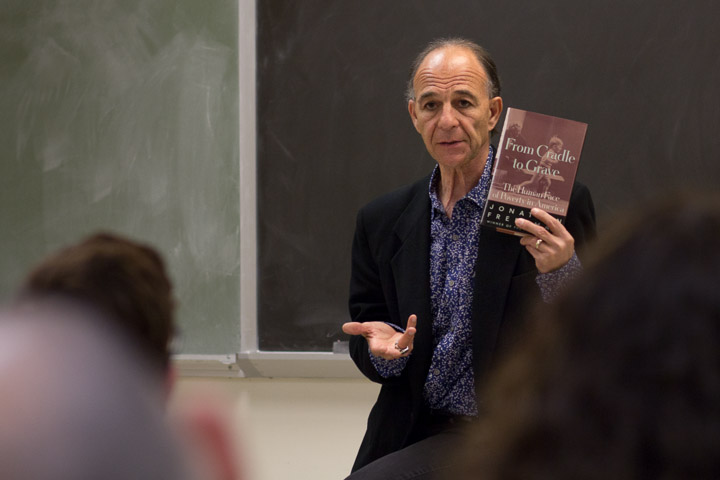Pulitzer Prize winner shares journalism experiences

By Jonathan Adler/The Guardsman
Pulitzer Prize-winning journalist and author Jonathan Freedman addressed a City College Literature Club event March 10 at Batmale Hall to an audience of 16 people.
In his speech, titled “Crossing Borders and Boundaries,” Freedman spoke about his journey traveling through South America as a reckless young adult, his struggles crossing between fiction and nonfiction writing throughout his career and his ultimate triumph as an editorial writer for the San Diego Tribune.
Freedman emphasized the importance of experiencing the open world and being willing to accept failure as a motivator for success. He said that failure is a common motif in his story.
Despite his passion for fiction writing, Freedman also wrote novels that were constantly rejected from publishing agencies.
While staying in South America, he lucked upon a reporting job for the Associated Press in Brazil. A creative fiction writer with no journalistic experience, Freedman’s grasping for the structural finesse of news writing proved to be an uphill battle.
“That was my rude awakening to journalism. It’s completely different,” Freedman said. “I had a pretty rough go of it.”
Freedman said he left the Associated Press feeling generally unsuccessful as a journalist. Despite the setbacks, failure continuously pushed Freedman to strive for success.
Years later, while raising his family in a cramped apartment in the Haight-Ashbury district of San Francisco, Freedman chanced upon an editorial position with the San Diego Tribune.
Freedman told the audience he’d never written editorials before he took the job. Nonetheless, his pieces on immigration and the perpetual conflicts at the United States-Mexico border led to winning a Pulitzer Prize, a crowning achievement for journalists and authors.
Freedman’s award-winning series of nine editorials, written over the course of six years, are cited by the Pulitzer Prize website as being instrumental in urging the passage of the U.S. Immigration Reform and Control Act of 1986, a historical amnesty bill which provided citizenship to about three million undocumented immigrants.
Freedman’s use of storytelling elements in his essays made his editorials unique. They included visual descriptions, symbolism and narrative structures.
“I was using my novel writing skills and my scene setting skills to connect to something that we thought was very important—to try to change the reality of the world,” Freedman said.
Freedman read his first editorial, “The Hole in the Border Fence,” to the audience, who sat listening attentively on the edge of their seats. The editorial painted a panoramic scene of a day at the United States-Mexico border, describing the routine conflicts between border patrol and Mexican immigrants. He used a hole he saw in the border’s fence as a metaphor for U.S. immigration policy.
“In my series that went on year after year after year, I was telling stories about people, and that’s why my editorials, I think, had such an impact on the legalization,” Freedman said. “By telling stories using novelistic techniques, I was able to humanize this issue. And by humanizing it, I opened people’s hearts to think of aliens as people.”
Freedman ended his speech by saying that after several years of attempts, he finally completed the novel he began writing while in South America.
The novel, “Benjamin East,” is scheduled to be published by Bright Lights Press of Palo Alto, Calif, in the fall of 2014.
City College Literature Club’s next meeting is on March 24 at Batmale Hall Room 347.

Comments are closed.